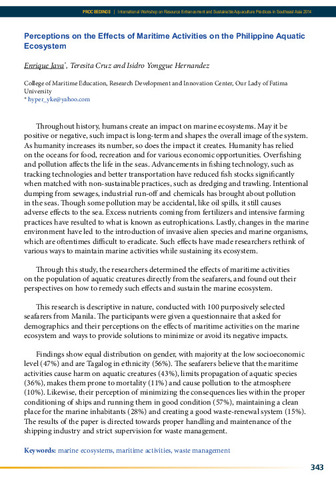Perceptions on the effects of maritime activities on the Philippine aquatic ecosystem
| dc.contributor.author | Java, Enrique | |
| dc.contributor.author | Cruz, Teresita | |
| dc.contributor.author | Hernandez, Isidro Yonggue | |
| dc.contributor.editor | Romana-Eguia, Maria Rowena R. | |
| dc.contributor.editor | Parado-Estepa, Fe D. | |
| dc.contributor.editor | Salayo, Nerissa D. | |
| dc.contributor.editor | Lebata-Ramos, Ma. Junemie Hazel | |
| dc.date.accessioned | 2016-01-20T17:43:07Z | |
| dc.date.available | 2016-01-20T17:43:07Z | |
| dc.date.issued | 2015 | |
| dc.identifier.citation | Java, E., Cruz, T., & Hernandez, I. Y. (2015). Perceptions on the effects of maritime activities on the Philippine aquatic ecosystem. In M. R. R. Romana-Eguia, F. D. Parado-Estepa, N. D. Salayo, & M. J. H. Lebata-Ramos (Eds.), Resource Enhancement and Sustainable Aquaculture Practices in Southeast Asia: Challenges in Responsible Production of Aquatic Species: Proceedings of the International Workshop on Resource Enhancement and Sustainable Aquaculture Practices in Southeast Asia 2014 (RESA) (p. 343). Tigbauan, Iloilo, Philippines: Aquaculture Department, Southeast Asian Fisheries Development Center. | |
| dc.identifier.isbn | 9789719931041 | |
| dc.identifier.uri | http://hdl.handle.net/10862/2807 | |
| dc.description | Abstract only. | |
| dc.description.abstract | Throughout history, humans create an impact on marine ecosystems. May it be positive or negative, such impact is long-term and shapes the overall image of the system. As humanity increases its number, so does the impact it creates. Humanity has relied on the oceans for food, recreation and for various economic opportunities. Overfishing and pollution affects the life in the seas. Advancements in fishing technology, such as tracking technologies and better transportation have reduced fish stocks significantly when matched with non-sustainable practices, such as dredging and trawling. Intentional dumping from sewages, industrial run-off and chemicals has brought about pollution in the seas. Though some pollution may be accidental, like oil spills, it still causes adverse effects to the sea. Excess nutrients coming from fertilizers and intensive farming practices have resulted to what is known as eutrophications. Lastly, changes in the marine environment have led to the introduction of invasive alien species and marine organisms, which are oftentimes difficult to eradicate. Such effects have made researchers rethink of various ways to maintain marine activities while sustaining its ecosystem. Through this study, the researchers determined the effects of maritime activities on the population of aquatic creatures directly from the seafarers, and found out their perspectives on how to remedy such effects and sustain the marine ecosystem. This research is descriptive in nature, conducted with 100 purposively selected seafarers from Manila. The participants were given a questionnaire that asked for demographics and their perceptions on the effects of maritime activities on the marine ecosystem and ways to provide solutions to minimize or avoid its negative impacts. Findings show equal distribution on gender, with majority at the low socioeconomic level (47%) and are Tagalog in ethnicity (56%). The seafarers believe that the maritime activities cause harm on aquatic creatures (43%), limits propagation of aquatic species (36%), makes them prone to mortality (11%) and cause pollution to the atmosphere (10%). Likewise, their perception of minimizing the consequences lies within the proper conditioning of ships and running them in good condition (57%), maintaining a clean place for the marine inhabitants (28%) and creating a good waste-renewal system (15%). The results of the paper is directed towards proper handling and maintenance of the shipping industry and strict supervision for waste management. | |
| dc.language.iso | en | en |
| dc.publisher | Aquaculture Department, Southeast Asian Fisheries Development Center | en |
| dc.subject | marine ecosystems | en |
| dc.subject | Maritime activities | |
| dc.subject | waste management | en |
| dc.title | Perceptions on the effects of maritime activities on the Philippine aquatic ecosystem | en |
| dc.type | Conference paper | en |
| dc.citation.spage | 343 | |
| dc.citation.conferenceTitle | Resource Enhancement and Sustainable Aquaculture Practices in Southeast Asia: Challenges in Responsible Production of Aquatic Species: Proceedings of the International Workshop on Resource Enhancement and Sustainable Aquaculture Practices in Southeast Asia 2014 (RESA) | en |


